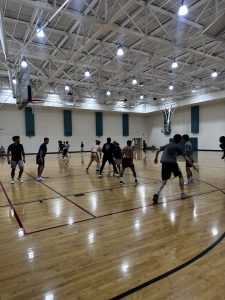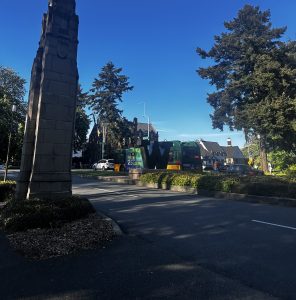7 How Pick-Up Basketball Creates a Community on Campus
Lynn Brown

Imagine this – you’re on the basketball court and you go in for a layup. You miss, catch your rebound, and you’re dribbling the ball, crossing your opponents to go in for a three-pointer. Your opponent falls to the floor; you swish the basketball in the net and your team cheers you on. The adrenaline in your body has you hyped to keep on going. However, you turn around and see your opponent who’s on the floor. You approach them and stick your hand out to help them get up. They get up with your assistance, and the next thing you know, after a few conversations, they turn out to be your lifelong friend.

The sport of basketball is a sport of art – with the components of fluidity, creativity, chemistry, teamwork, and storytelling. It is reflected in professional basketball and even a regular 5-on-5 pickup game with random people you just met. However, many people often don’t recognize the importance of pick-up games compared to professional basketball. Pick-up basketball allows individuals to a community, and find their true-self within the sport.
The Intramural Activities Building (IMA) at the University of Washington allows students to engage in pick-up basketball to be apart of a community. However, what is a community? A community is often described as a synonym for place, however, they share a common interest of values and goals. A strong sense of community views social capital to be important, (National Academies Press, 66, 67).
I asked an avid pick-up basketball player at the University of Washington, what does the sport of basketball mean to you?:
“Basketball allows you to grow mentally, it gives you a chance to grow and learn from your mistakes with a community of people” – Larissa Wang, Second Year Student at the University of Washington.
There are several ways in which pick-up basketball can be used to create a sense of community at the University of Washington. When you are on the basketball court, you come from different backgrounds and also different skill levels but are met with people who share a common interest in the sport with you. It allows an opportunity for students, faculty, and staff to connect and bond over their love for basketball. This shared interest forms the foundation of a community where people can relate to one another and engage in meaningful interactions. Many people who play pick-up basketball at the IMA are individuals who use to play for an organized league. I interviewed a student, Sadio Traore, and asked him, what do you enjoy most about playing pickup basketball compared to organized league play? He responded that there’s more freedom to the game without any restrictions, but it can lead towards arguments due to the game not being organized.

However, that is the beauty of pick-up basketball. Basketball is a team sport that requires cooperation and coordination among players. Through pick-up basketball games, participants learn to work together, communicate effectively, and develop teamwork skills.
“Solving conflicts during pick-up basketball isn’t that hard, because we are a community, we really just come to a mutual agreement and understanding of each other despite our differences.” – Sadio Traore, Third Year Student at the University of Washington.
The collaborative aspect of basketball can translate into stronger bonds and a sense of camaraderie among the players. I asked students at the IMA’s basketball court where they met the majority of their friends on campus, and they all responded with the same answer: through basketball. Pick-up basketball serves as a social platform where people can meet new individuals and expand their social networks. This can enhance a student’s overall university experience and lead to more than friendships, but also study groups and professional networking opportunities.
“I would have never met my friends if it wasn’t for playing basketball at the IMA. It has allowed me to learn more about myself and also feel more comfortable adapting to a big school setting.” – a student at the University of Washington.
Additionally, pick-up basketball at the IMA has positive effects to students overall college experience. Attending university can be scary, especially when it is a school, such as the University of Washington which has over 50,000 students. It can be hard to make friends or find your “true” self in a big setting. This can cause students to feel lonely throughout their time in college, which may have detrimental affects to their mental health and performance in school. However, through students engaging in pick-up basketball you are apart of a community where you meet new people and create a sense of belonging. Additionally, students are open to the opportunities of personal growth; from discipline, to resilience, perseverance, and the ability to cope with success and failure. They develop mental toughness, as for basketball is a game which requires mental attention. By practicing and working on improving their skills, students develop self-motivation and a strong work ethic.
Although pick-up basketball is considered a thin institution at the IMA, pick-up basketball can be considered a thick institution for a community that is created through students who partake in this sport at the IMA. Pick-up basketball has more loosely organized and has fewer formalized rules and structures; this is due to the University of Washington not holding significance nor symbolic meaning for pick-up basketball under their values. It lacks deep symbolic meanings and the broader societal impact of thick institutions; however, a community can characterize the complex sets of meanings, rituals, and traditions which shape individual lives and identities.

Overall, pick-up basketball at the IMA has allowed University of Washington students to come together, promote inclusivity, and provide a platform for socializing, teamwork, and physical well-being. These shared experiences have created a strong community which ultimately is essential for a student’s overall university experience.
CITATION:
Brooks, D (2017) How to Leave a Mark on People, The New York Times Journal.
ChatGPT (2023) Personal communication.
The National Academies Press (2002) The Importance of Place and Connectedness.
Traore, S (2023). Personal Interview. Seattle, WA.
Wang, L. (2023). Personal Interview. Seattle, WA.
Media Attributions
- IMG_7703
- IMG_7629
- IMG_7623
- 9CE88259-2F5F-4285-A8AC-596D9137B399

